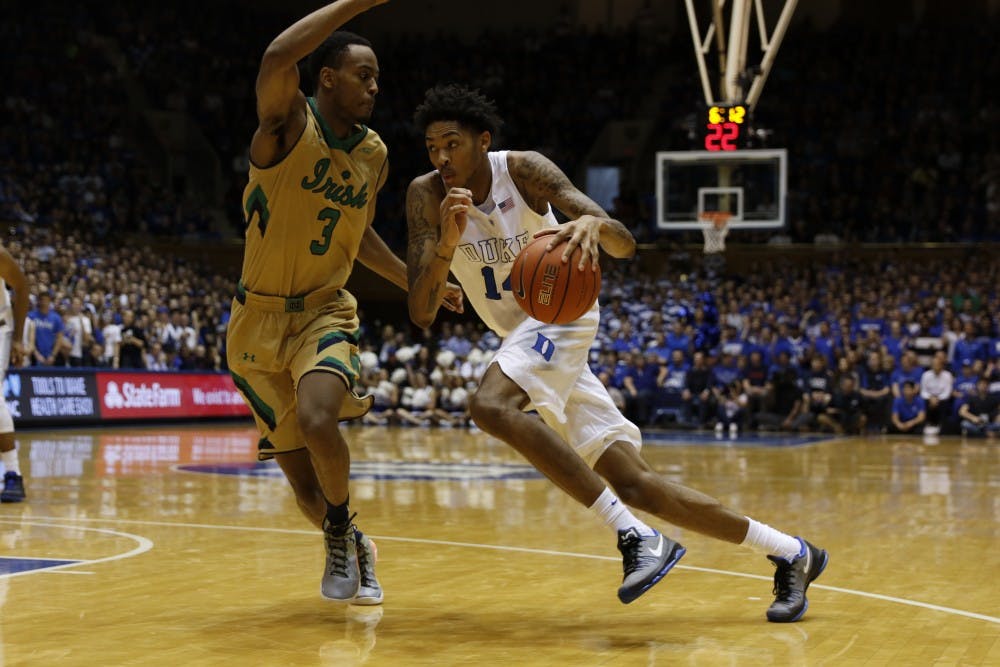When the 15 finalists for the Wooden Award—the annual prize for the most outstanding college basketball player—were announced Saturday, there was one notable name missing from the list.
It wasn’t Michigan State’s Denzel Valentine or Oklahoma’s Buddy Hield. Instead, it was freshman phenom and projected No. 1 overall pick Ben Simmons who was nowhere to be found.
According to ESPN Insider Jeff Goodman, Simmons was not certified by Louisiana State to appear on the ballot because he “did not have the necessary criteria to be eligible.” Considering the 6-foot-10 forward was benched for the start of the Tigers’ Feb. 20 game against Tennessee for academic issues, this led many to assert that Simmons had failed to meet the academic requirements for the award—a meager 2.0 GPA.
If the freshman is struggling academically as the reports have pointed out, the question for many then becomes how he is even able to play for Louisiana State if he cannot qualify for an award that recognizes his abilities on the court. But another big issue stemming from the reports is Simmons' status as a presumed one-and-done player in the NCAA, with the bright lights of the NBA ahead of him.
Prior to the 2006 draft, the NBA established a minimum age requirement of 19 to play at the professional level. For many, this was a way to ensure that players went to college and developed prior to going pro. Others saw it as a way to keep top-flight talent around for at least one year in what is essentially the farm system of the NBA.
The problem, as Simmons’ case demonstrates, is that players that have no interest in sticking around for four years at the college level, putting up video-game numbers—Simmons is averaging 19.6 points, 11.9 rebounds and 5.0 assists per game—and foregoing the ‘student’ part of ‘student-athlete.’
So, why not weed out the players that do not want to be there and just let them move on to earn the big bucks?
Although it seems to make sense to return to the norm of high school players going pro—it worked well for Kevin Garnett, Kobe Bryant and LeBron James—NBA Commissioner Adam Silver has openly stated that he would rather raise the age to 20, making most players stick around for two years rather than one.
But that does not solve the problem. The players do not want to spend two years at a school just to abandon ship mid-collegiate career and pursue the dreams they envisioned the entire time. Considering Simmons’ situation, why not just let him go straight into the NBA in the first place, instead of squandering the Tigers’ academic reputation for a mediocre 18-13 record that will most likely keep them out of the Big Dance? In the long run, if he leaves after the season for the NBA, was he ever even a student?
Now with the draft on the horizon and his collegiate career hanging by a thread—unless his team can make a 2011 Connecticut-esque run in the SEC tournament—Simmons has to consider how his actions off the court may affect his stock moving into June.
Despite his struggles of late, Duke’s Brandon Ingram was just named ACC Rookie of the Year and nabbed a spot on the All-ACC Second Team with his 16.7 points, 6.8 boards and 1.4 blocks per game. Generally considered the only player that could make a push at the No. 1 spot ahead of Simmons, Ingram may have to come alive in the postseason if he wants a shot at the first overall pick.
But considering the reports surrounding Simmons' academic situation, why not take Ingram, who has avoided off-the-court issues and is being shipped directly from Coach K’s one-and-done farm in Durham? That seems like a more reliable option, right? Probably not.
Although Simmons has developed a knack for not meeting the academic standards set before him, he should have never been asked to. If it were not for a superfluous rule forcing him to play in a league that he had no interest in, then he would be on his way to challenging Karl-Anthony Towns for Rookie of the Year at the highest level.
The academic rigors of being a student-athlete at the Division I level are hard, so give Simmons a break. As Blue Devil big man Alaa Abdelnaby once said, “The only way I can make five A’s is when I sign my name.”
So let’s stop making players who don’t want to pursue the collegiate avenue take that path and let them make their own decisions about when and where to play. We do not force our children to go to college if they choose a different route, so why should we force our athletes?
Get The Chronicle straight to your inbox
Signup for our weekly newsletter. Cancel at any time.

